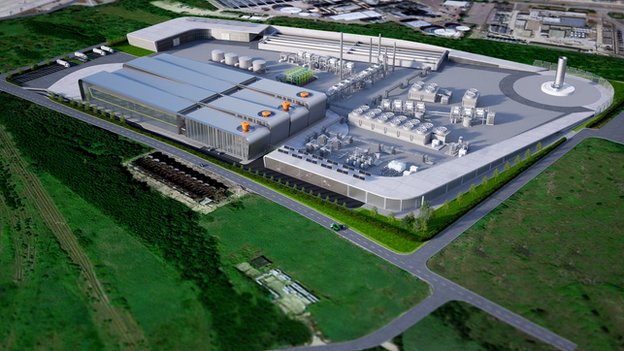The blog does not usually post much about biofuels but the technology involved in this project announcement is also associated with the developments of waste syngas-based chemicals.
Yesterday, advanced biofuels technology developer, Solena Fuels, announced that it will build the world’s first facility, dubbed “GreenSky”, that will convert landfill waste into jet fuel, which will be located in UK’s Thames Enterprise Park, part of the site of the former Coryton oil refinery in Thurrock, Essex. The site reportedly has excellent transport links and existing fuel storage facilities. One thousand construction workers will be hired to build the facility which is due to be completed in 2017.
Approximately 575,000 tonnes of post-recycled waste, normally destined for landfill or incineration, will be converted into 120,000 tonnes of clean burning liquid fuels using Solena’s Integrated Biomass Gas to Liquid (IBGTL) technology. British Airways announced that it has made a long-term commitment to purchase all 50,000 tonnes per annum of the jet fuel produced at market competitive rates for the next 11 years, which equates to $550 million at today’s prices.
British Airways said the construction of the GreenSky London fuel facility at Thames Enterprise Park will lay the foundations for the company to significantly reduce its carbon emissions. The airline is also providing construction capital and expects to become a minority shareholder in GreenSky.
Solena has been developing the project and will be using its patented high temperature plasma gasification technology to convert the waste efficiently into synthetic gas. The gas will then be converted into liquid hydrocarbons using third party technologies which will include cleaning and conditioning of the gas, a Velocys Fischer-Tropsch conversion process, hydrocracking and electric power production. With the initial engineering design completed, Solena and its partners are now starting the next phase of engineering of the GreenSky London facility.
Here is a cool video from Solena describing its technology process:
By the way, Velocys (previously known as Oxford Catalysts Group PLC), which developed the smaller-scale biomass-to-liquids (BTL) technology for the GreenSky London project, is expecting to generate revenue in excess of $30 million during the construction phase of the project, and additional ongoing revenues of more than $50 million over the first 15 years of the plant’s operation.
Thames Enterprise Park and neighboring Thames Oilport, established in 2012, is a joint venture with Greenergy as one of the investors and the site project facilitator for this project.
Going back to the bio-based chemicals connection, bio-naphtha, as you heard from the video, is one of the products that comes out of this gas-to-liquid process. Naphtha is one of the main important feedstock for the chemical industry.




